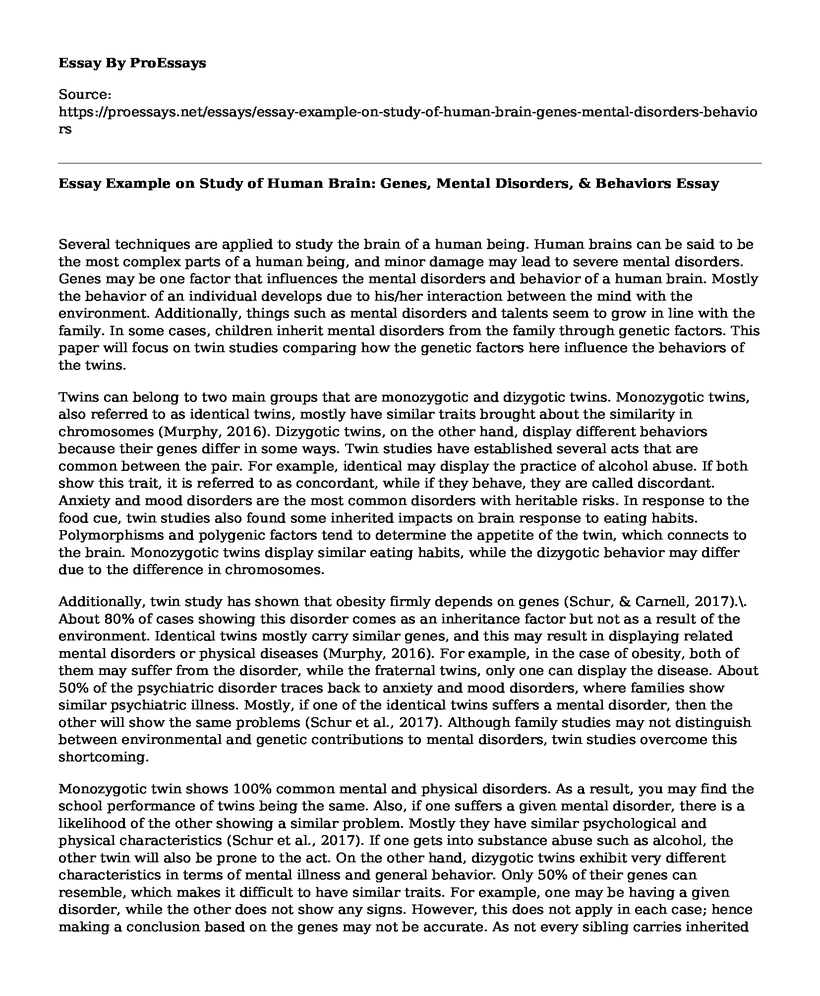Several techniques are applied to study the brain of a human being. Human brains can be said to be the most complex parts of a human being, and minor damage may lead to severe mental disorders. Genes may be one factor that influences the mental disorders and behavior of a human brain. Mostly the behavior of an individual develops due to his/her interaction between the mind with the environment. Additionally, things such as mental disorders and talents seem to grow in line with the family. In some cases, children inherit mental disorders from the family through genetic factors. This paper will focus on twin studies comparing how the genetic factors here influence the behaviors of the twins.
Twins can belong to two main groups that are monozygotic and dizygotic twins. Monozygotic twins, also referred to as identical twins, mostly have similar traits brought about the similarity in chromosomes (Murphy, 2016). Dizygotic twins, on the other hand, display different behaviors because their genes differ in some ways. Twin studies have established several acts that are common between the pair. For example, identical may display the practice of alcohol abuse. If both show this trait, it is referred to as concordant, while if they behave, they are called discordant. Anxiety and mood disorders are the most common disorders with heritable risks. In response to the food cue, twin studies also found some inherited impacts on brain response to eating habits. Polymorphisms and polygenic factors tend to determine the appetite of the twin, which connects to the brain. Monozygotic twins display similar eating habits, while the dizygotic behavior may differ due to the difference in chromosomes.
Additionally, twin study has shown that obesity firmly depends on genes (Schur, & Carnell, 2017).\. About 80% of cases showing this disorder comes as an inheritance factor but not as a result of the environment. Identical twins mostly carry similar genes, and this may result in displaying related mental disorders or physical diseases (Murphy, 2016). For example, in the case of obesity, both of them may suffer from the disorder, while the fraternal twins, only one can display the disease. About 50% of the psychiatric disorder traces back to anxiety and mood disorders, where families show similar psychiatric illness. Mostly, if one of the identical twins suffers a mental disorder, then the other will show the same problems (Schur et al., 2017). Although family studies may not distinguish between environmental and genetic contributions to mental disorders, twin studies overcome this shortcoming.
Monozygotic twin shows 100% common mental and physical disorders. As a result, you may find the school performance of twins being the same. Also, if one suffers a given mental disorder, there is a likelihood of the other showing a similar problem. Mostly they have similar psychological and physical characteristics (Schur et al., 2017). If one gets into substance abuse such as alcohol, the other twin will also be prone to the act. On the other hand, dizygotic twins exhibit very different characteristics in terms of mental illness and general behavior. Only 50% of their genes can resemble, which makes it difficult to have similar traits. For example, one may be having a given disorder, while the other does not show any signs. However, this does not apply in each case; hence making a conclusion based on the genes may not be accurate. As not every sibling carries inherited disorders from his/her family.
References
Murphy, E. (2016). African-American representation in family and twin studies of mood and anxiety disorders: A systematic review. Journal of affective disorders, 205, 311-318. https://www.sciencedirect.com/science/article/pii/S0165032716308679
Schur, E., & Carnell, S. (2017). What twin studies tell us about brain responses to food cues. Current obesity reports, 6(4), 371-379. https://link.springer.com/article/10.1007/s13679-017-0282-7
Cite this page
Essay Example on Study of Human Brain: Genes, Mental Disorders, & Behaviors. (2023, Apr 24). Retrieved from https://proessays.net/essays/essay-example-on-study-of-human-brain-genes-mental-disorders-behaviors
If you are the original author of this essay and no longer wish to have it published on the ProEssays website, please click below to request its removal:
- Essay Sample on Human Trafficking and Suicide
- Emotional Dysregulation - Essay Sample
- Essay on Personality Psychology: Examining Individual Differences in Personality
- Tech Impact: Social & Cognitive Development in Teens - Annotated Bibliography
- Paper Example on Alternate Turns: A Strategy for Moving Efficiently
- Brain: The Control Center of Our Lives - Essay Sample
- Essay Sample on Maximizing Well-Being: Understanding Mindfulness & Its Link to Positive Psychology







